i was on my usual nightwalk that night in search for gold. you can read about that walk in the link below.
i was in search for "gold" but what i found was something more.
koami shrine (小網神社)
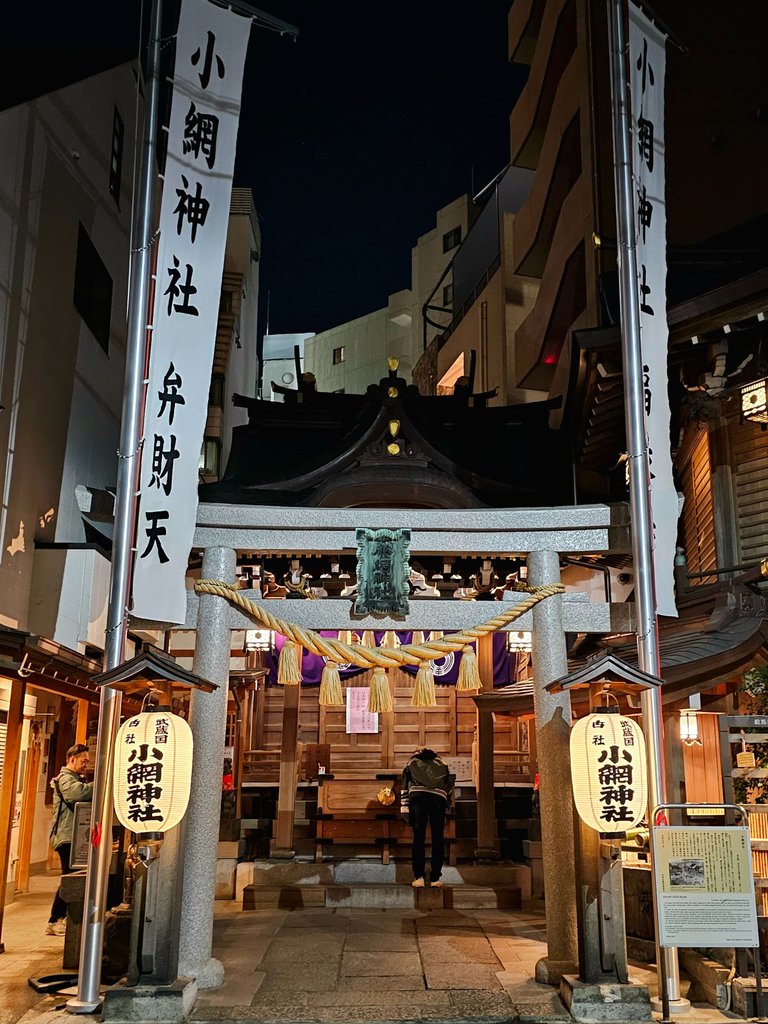
nihonbashi area.initially read about this shrine from @go-kyo and got really interested in the idea of visiting a new place in japan. and the location was quite perfect for my nightwalk, google maps said that it was reachable on foot in around an hour and 30 minutes. that is totally up my alley, totally doable so off i went southward to the
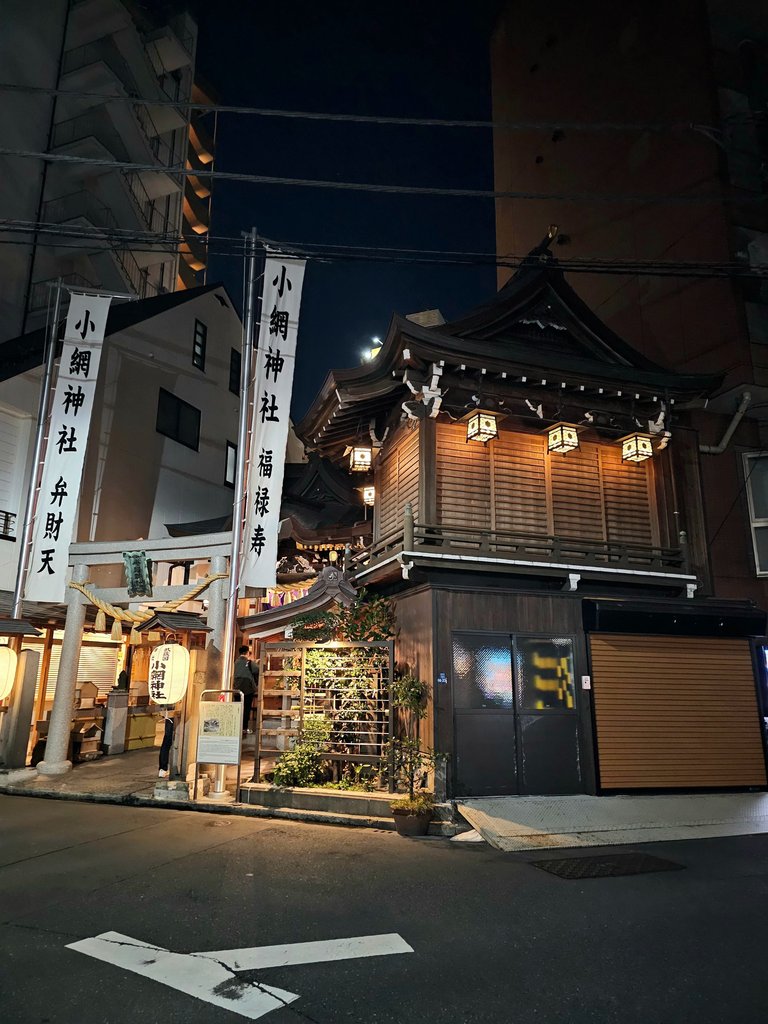
enjoyed my journey on the way to this shrine so i was caught by surprise when i reached the place. i usually take lots of pictures during my nightwalks and this structure on the side with lanterns was the first that came to view. i moved to find a different angle and low and behold it was the kagura hall (a building in the shrine where the sacred dance, kagura, and music is performed and offered to the gods) of the shrine i targeted. it was but a small shrine, but it had a constant flow of people visiting even in the deep night; i reached the area around 9 pm. that was foretelling of how revered this shrine must have been.
quick history
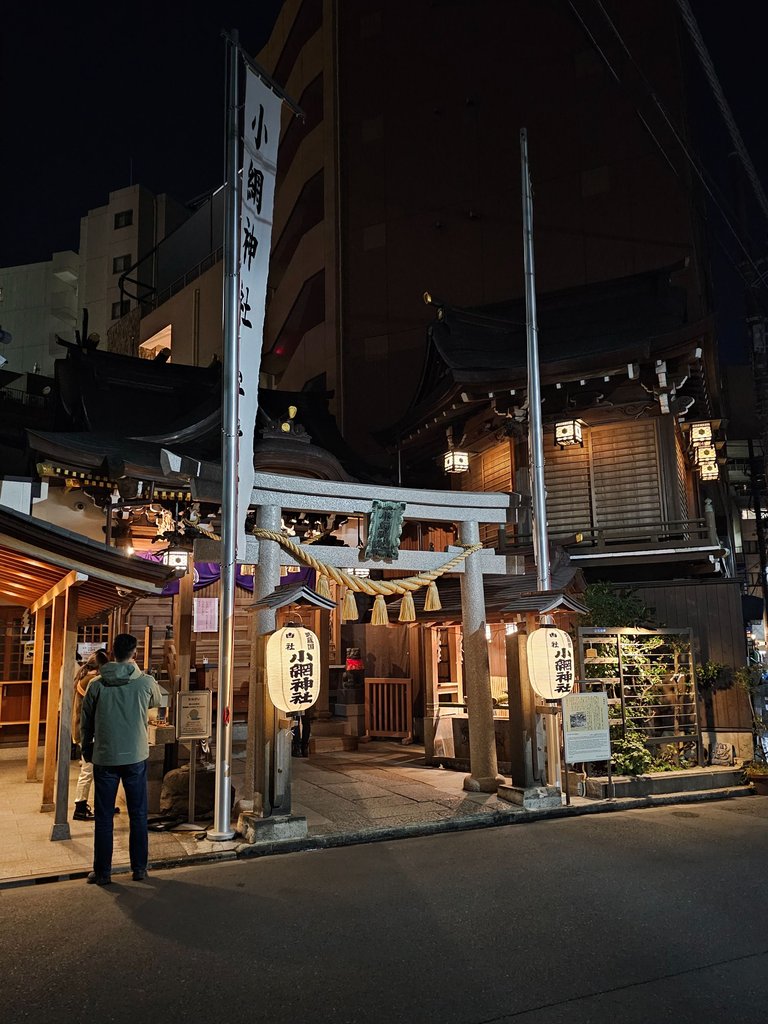
a quick read of their website suggested that the actual founding date of the shrine was unknown but must have been 1000 years ago based on a prominent monk vital in its formation. the current shrine building and kagura hall were built in 1929 after the original was destroyed in the great kanto earthquake of 1926. it was said that the chief priest evacuated and brought the shrine's sacred objects with him to the nearby bridge, everyone in the evacuation site felt safe and the bridge itself did not collapse.
in the great tokyo air raid of 1945 during the second world war, the downtown area of tokyo had unprecedented damage, but the koami shrine and all buildings in its grounds miraculously escaped the war damages. it is the only pre-war shrine building still standing in the nihonbashi area and is registered as cultural properties of this area. with this history, the shrine is revered for good fortune and protection from misfortunes.
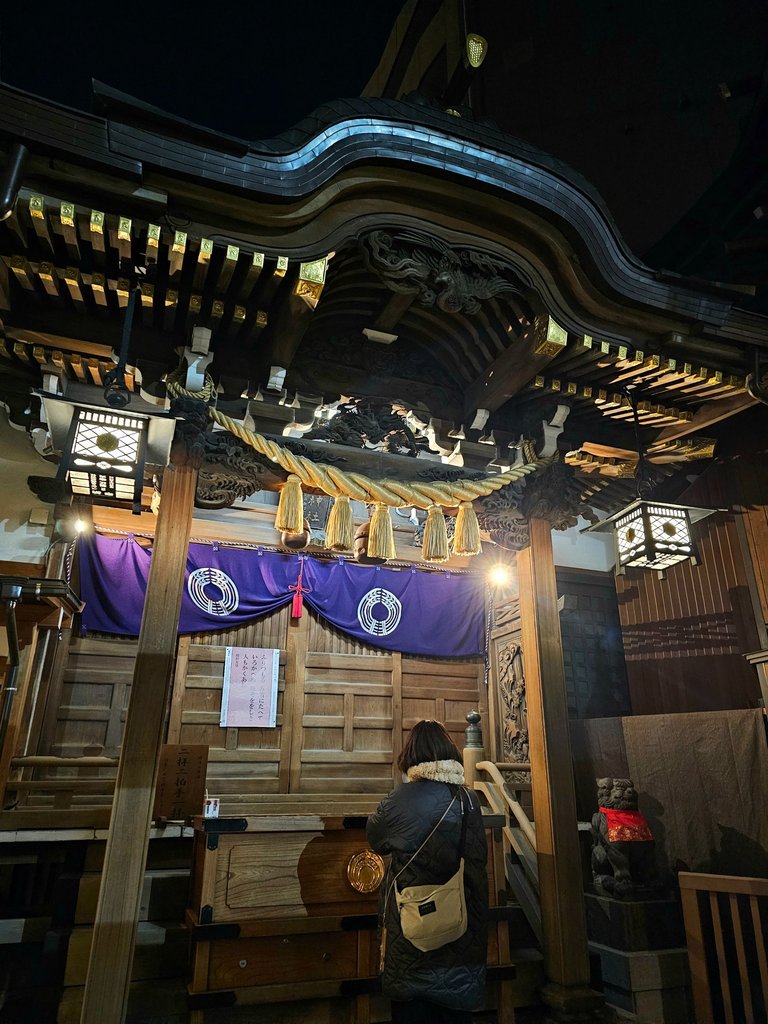
the main shrine features prominent wood carvings. on the right side, slightly seen in the picture above, is a carving of the ancient legend of yoro falls where a faithful son's thoughts turned the waterfall's water into sake to offer to his father.
above the side panels near the ceiling were dragon carvings, one on each side, which were believed to bring good luck and ward off evil spirits. i only managed to take pictures of the front part of the main shrine though.
money washing
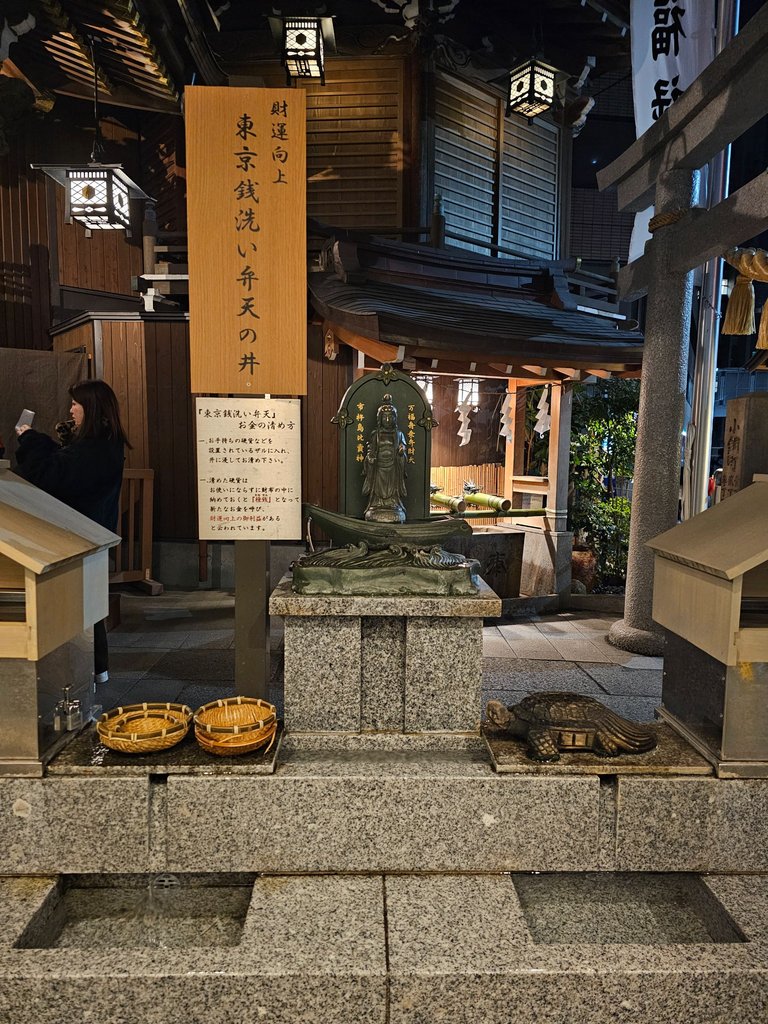
on the left side of the main shrine was this figure of Benzaiten 弁財天 riding a boat. on my previous research, this god is part of the seven lucky gods of fortune.
Benzaiten 弁財天
The God of Good Results in Learning and Fortune. The only female among the group, is also the goddess of music and charm.
every year on the 28th of october, a festival is held for this specific statue and that alone gathers a big crowd.
immediately below the statue is a fountain or a well, this was not for drinking nor washing of hands, but this was specifically for washing money. you take out your money, put it inside this small basket, dip it in the water, and put it inside your wallet. this money is believed to bring you good fortune.
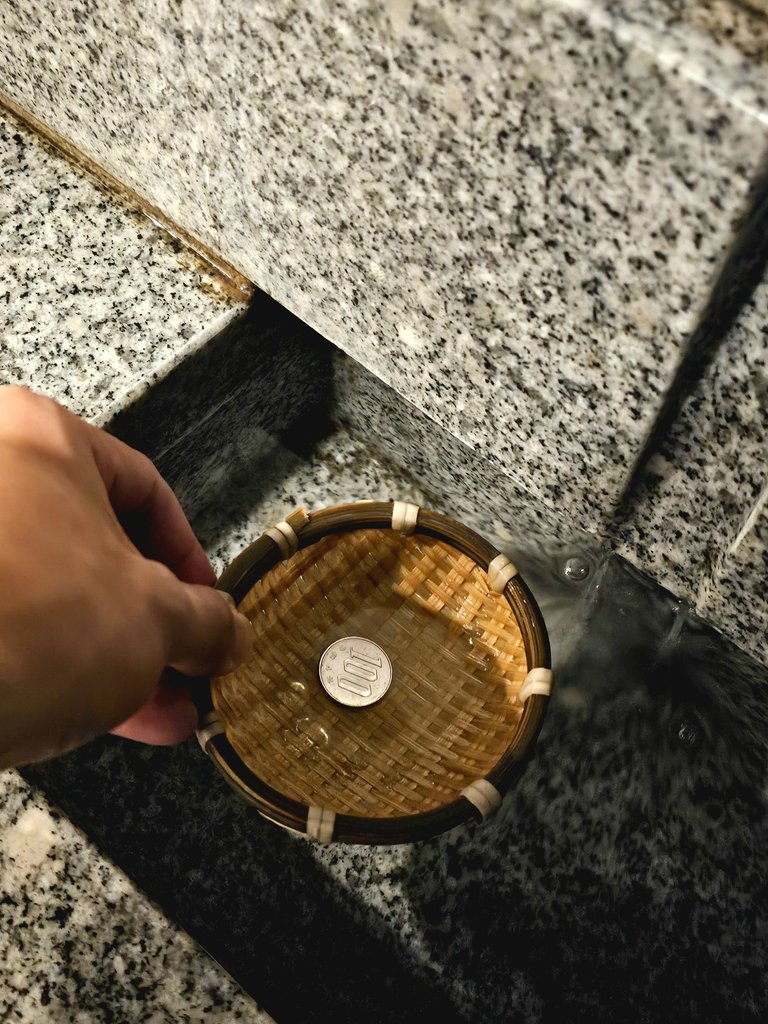
i was just standing there observing how the people did the money washing. i wanted to take some pictures but definitely do not want to bother the others. since i was already there, then might as well do some washing myself. the humble 100 yen coin got purified. one thing was for sure, that water was cold.
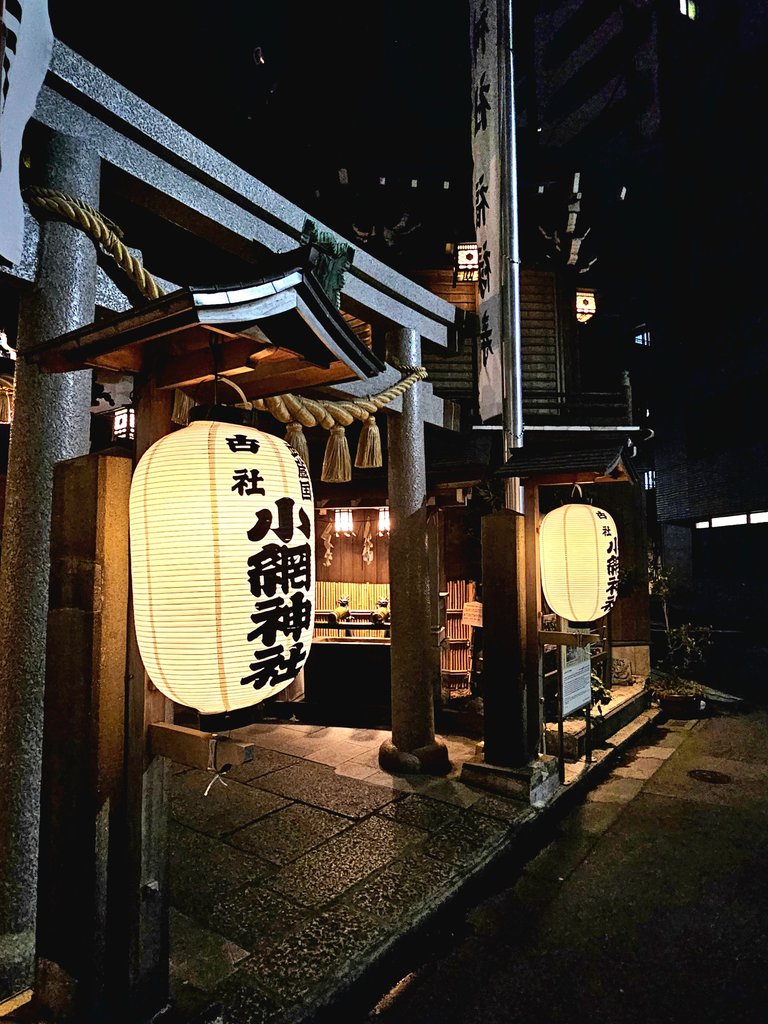
i took this final photo of the shrine that night. i failed my initial goal of finding "gold", but that is fine. i may have found no "gold", but i found good fortune for the whole year. and that is even better!
you can read more about this shrine from their site as follows:
Koami Shrine 小網神社
16-23 Koamicho, Nihonbashi, Chuo-ku, Tokyo
https://www.koamijinja.or.jp/index.html
as always, AMPING KANUNAY!

all content is by yours truly unless otherwise specified
all photos are taken with a galaxy s23 ultra
You can check out this post and your own profile on the map. Be part of the Worldmappin Community and join our Discord Channel to get in touch with other travelers, ask questions or just be updated on our latest features.
Congratulations, your post has been added to the TravelFeed Map! 🎉🥳🌴
Did you know you have your own profile map?
And every post has their own map too!
Want to have your post on the map too?
- Go to TravelFeed Map
- Click the create pin button
- Drag the marker to where your post should be. Zoom in if needed or use the search bar (top right).
- Copy and paste the generated code in your post (any Hive frontend)
- Or login with Hive Keychain or Hivesigner and click "create post" to post to Hive directly from TravelFeed
- Congrats, your post is now on the map!
PS: You can import your previous Pinmapple posts to the TravelFeed map.Opt Out
Very interesting about the money washing my friend!😊
Japan has so many interesting traditions!😊
so true. i had to visit the shrine when i heard of it.
Looks like a beautiful shrine, so nice that you share photos!😊
thanks my friend. it is but a small one but beautiful
👍😊
Very interesting. I have neever heard about money washing before. I wonder if it is just a tradition to that shrine or across Japan?
i think it is specific to certain shrines only. i have only heard of it from this shrine
@dbooster you ever here of money washing at shrines before? I don't think I recall this on Okinawa. Would this be something shrine specific maybe?
It's not a typical thing at shrines, but is probably due to the association with Benzaiten. She is associated with dragons, a water god in Japan. As such temples and shrines to her are often built near bodies of water. The washing money thing probably comes from that water connection. Water in general is a purifying thing in Shinto, too. See all the hand washing that people do at shrines.
Appreciate the education sir
Congratulations @itz.inno! You received the biggest smile and some love from TravelFeed! Keep up the amazing blog. 😍
Thanks for using TravelFeed!
@for91days (TravelFeed team)
PS: Did you know that we have our own Hive frontend at TravelFeed.com? For your next travel post, log in to TravelFeed with Hive Keychain or Hivesigner and take advantage of our exclusive features for travel bloggers.
You are the best guide. The performance of the shrine is very impressive. I'm looking forward to your next trip around your city.
I was surprised that there were worshippers even at night! Sure is cold to wash money at night, isn't it? I washed my 500 yen coin and it is a little hard not being able to use that for a year🤣
for a small shrine that is really something to have worshippers at night. it was cold, the money felt freezing. good thing i only got 100 coin that time